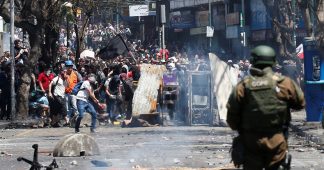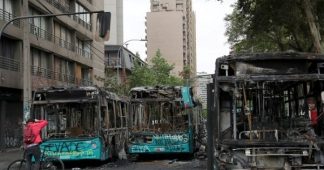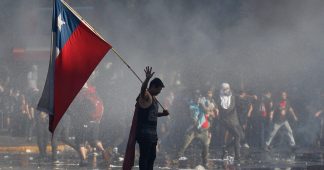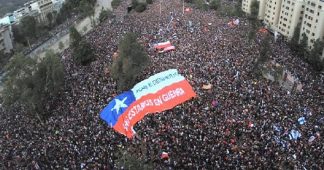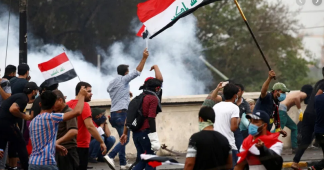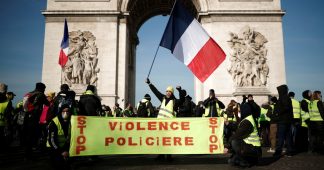By John Englart
November 5, 2019
The protests against the regime of centre-right Chilean President Sebastian Pinera continued on “Super Monday”, November 4, with protests in the capital Santiago and other cities.
Local police violently suppressed the protests and dispersed the crowd with water cannons and tear gas. There was resistance by many — mainly youth — using what stones could be found, slingshots and street barricades, against live rounds and tear gas grenades.
Protestors are calling for Pinera’s resignation, a constitutional assembly to draw up a new constitution and action to address structural social inequalities.
These inequalities, the result of neoliberal policies for nearly 50 years, were originally implemented by General Augusto Pinochet’s military junta after the CIA-backed coup of 1973.
In Chile, one of the richest countries in Latin America, the top 1% own 33% of the wealth.
There has been a longstanding condemnation of the crumbling public health system, the expensive education system, and a pension system that pays out very little. Mandatory contributions by workers are invested in the corporations that exploit them, with a 45-hour work week.
The latest round of social unrest was triggered by a Santiago metro fare rise, the second this year. School students started a campaign to jump the turnstiles. This was followed by increasing police repression, escalating with the involvement of the broader population, who are angry over the poor being made to pay for services while the rich pay minimal taxes.
A recent leak showed registers of organisations under Carabineros (Chilean National Police) surveillance, including water defence leader Rodrigo Mundaca’s movements.
News outlet Interferencia published them as PacoLeaks, exposing about 10,000 documents from police institutions.
On October 25, an estimated 1.2 million people took to the streets of Santiago, while large numbers protested peacefully in cities up and down Chile.
This crisis has been brewing for some time. Unidad Social, an alliance of civil society organisations, which issued a Popular Movement Manifesto in August, said: “The world of work, pensioners, health, education and culture, housing, territories, water and environment, women, native peoples, immigrants, among others, in the day to day we live the disastrous and sometimes catastrophic consequences of decades of neoliberal policies and to promote individualism over solidarity and where the owners of power, the business class and those who represent them, only think about maximizing their profits by not respecting and violating fundamental freedoms and rights — human, political, economic, social rights, ethnic, sexual, cultural — of all the inhabitants of the territory.
“All of the above has been increased in the current government, with regressive public policies, systematic increase in repression.”
The Central Unitaria de Trabajadores (CUT) joined more than 100 organisations, including trade unions and social organisations that are part of the Social Unity Roundtable, in issuing a new call to fill the streets on November 4, to continue expressing the demands that have been heard loudly since October 18.
While the National Institute of Human Rights (INDH) said that the number of people injured during recent protests numbered 1570, these figures were disputed by Red Cross representative Patricio Acosta, who said: “I can responsibly say that they are more than 2500 up to this date”.
Up to October 31, five people had died from acts committed by state agents during the protests, while two people died in custody.
The interior ministry is investigating 840 complaints of violation of human rights. Nearly 300 children have been injured by police or military during the protests and 40 complaints of sexual abuse by the police and military, according to INDH.
According to the Chilean State Medical College and the Chilean Opthalmalogy Society, 126 people have been shot in the eye since October 19. Spokesperson Enrique Morales said: “The worst part is, this is caused by government agents.”
Even being an investigator for INDH doesn’t provide protection. Investigator Jorge Ortiz was shot 7 times during the October 29 protests in Santiago. INDH filed a complaint that read: “Something intolerable has occurred … [They shot] in no dangerous situation.”
Recent polling by survey platform Cadem shows support for Pinera has plummeted to 13%, the worst ever for a Chilean president since the return of democracy.
The poll also revealed that 87% think the country needs a new constitution to solve the crisis.
Conversely, Pinera has said a dialogue with the people is necessary to solve the social unrest.
In the north of Chile, in the Atacama desert, Australian mining giant BHP owns two copper mines, Spence and Escondida, the latter being the largest copper mine in the world.
On October 29 the Sindical union issued a statement that the union of Minera Escondida workers had resumed their stop work because of the “constant abuses of the company and the repression against the people of Chile”. Work at the mine site has completely stopped.
Social movements, including the trade union movement, are setting up cabildos, or citizen councils, to provide broad community feedback to the government in a systematic way, rather than the selective dialogue favoured by Pinera.
Chile has a long history of using citizen assemblies as part of its political process, a mechanism imported from Europe with the Spanish conquest.
These cabildos are currently convening throughout Chile, with more than 10,000 people participating in meetings to discuss the social crisis and associated issues. They will continue meeting until November 7.
The topics most repeated revolve around the constituent assembly and a new constitution, pensions and the NO+AFP (“No More AFP”) campaign against Pinera’s pension fund reforms, together with environmental protection, the nationalisation of basic supplies, education and health, and justice for the recent human rights violations.
The size of the meetings have been anywhere between 10 and 1000 people, but minutes are taken and systematised to feed in to the social dialogue with the government.
Chile was due to host the APEC conference over November 17–18, and the United Nations Climate Conference from December 2–13. However, on October 31, the government announced it would not be hosting either: China and the US are looking for a venue to deliberate on trade issues, and the UN climate conference have been moved to Madrid.
After today’s suppression of peaceful protests, it would appear Pinera wants to avoid international focus, to concentrate on suppression. He follows in the bloody footsteps of Pinochet.
* John Englart is the convenor of Climate Action Moreland in Victoria
Published at https://www.greenleft.org.au/content/eyewitness-chile-police-repression-not-deterring-protesters
